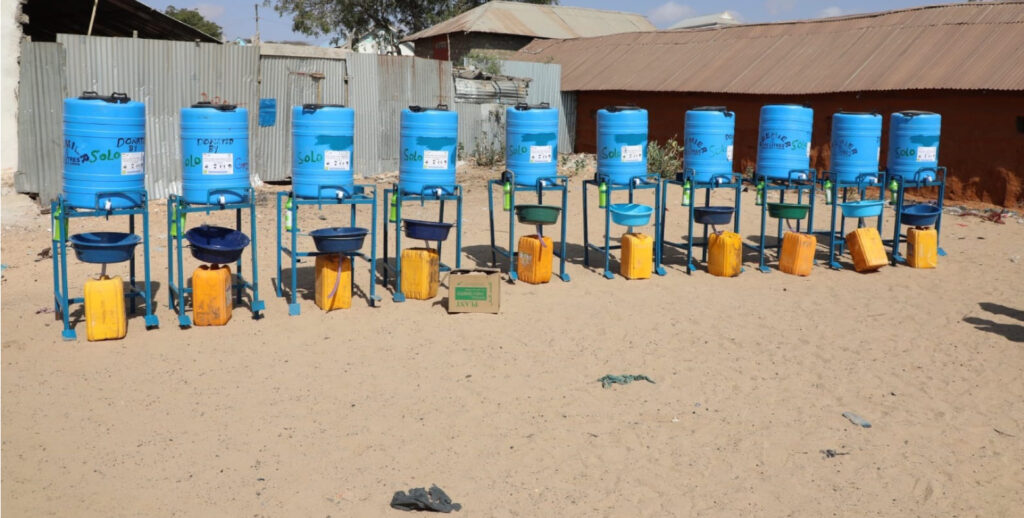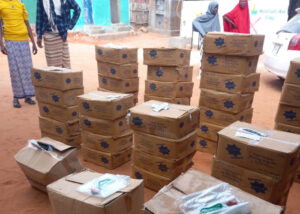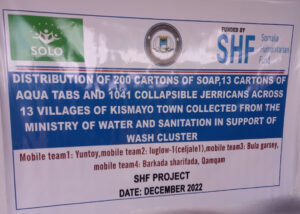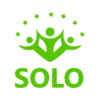Water Sanitation and Hygiene
Clean water and sanitation is central to almost every aspect of SOLO’S work. Our campaign and humanitarian response is to help families get access to clean water and reduce environmental health risk by managing sanitation safely. We believe clean water and clean environment shouldn’t be a luxury. It has to be available to everyone regardless of where they live but unfortunately lack of clean water and basic sanitation skill kills more people each year than all forms of violence. We work towards eradicating that.
Access to clean water for human consumption is the biggest challenge. In an Assessment that SOLO carried out i.e Rapid assessment on wash on Kismayo, the near water source borehole in some villages is 13 KMs away. This is a commercial water services providers where the price of water is around 0.5 dollars per 20 litre Jerrican which the vulnerable, jobless villagers cannot afford.
Many IDPS of the above villages distance takes 1 hour to reach the borehole, where there are protection concerns for the girls and women who mostly fetch water for their families.
During the assessment, almost 80% of the assessed households and schools are facing insufficient water access, with heavy resilience on unprotected sources / fetching water from long distances. Approximately two third indicated issues with either water quality or quantity and reported water treatment practices were limited, raising concerns about access to safe drinking water and related health implications for contraction of water borne disease. around one third of the households indicating no latrines access furthermore the hygiene safety standards of toilets visited were generally poor. Lack of access to hygiene items such as soap have likely to contributed to poor hygiene condition the Solo team could see many girls and young women carrying 20 litre Jerricans of water at their back, sweating, exhausted and emaciated.
The Ministry of Energy and Water Resource in Jubaland state also identified the same need and recommended a change of the above.
Even at the cost of quadrupling our work, SOLO aims to ensure communities especially the less disadvantaged ones get access to clean water and sanitation skills. The organization outlines how its efforts and community support can help prevent death due to diseases like typhoid and cholera.

SOLO in collaboration with Regional WASH cluster and ministry of water and energy Jubaland state distributed collapsible jericans, soaps and Aqua tabs to 500 households living in Qamqam settlements. Before the distribution of NFI materials is implemented, the project team spearheaded by the health supervisor and the other project staff such as WASH officer, M&E and the other mobile team in the site conducted community engagement with local elders in order to discuss the distribution procedure, when and where for identification and selection of the beneficiaries. In a nutshell, the following sub-activities were done;
- Selection and registration of beneficiaries was done
- Distribution of the Assorted NFI materials to the beneficiaries was done
- Verification of the beneficiaries was done
Through this, SOLO seeks to enhance sanitation as well as promote access to basic services for the drought affected population in Qamqam settlements who majorities are women and children. SOLO with the support of WASH cluster plans to address concern related to poor hygiene by supplying some sanitation tools and materials to the most vulnerable members of the population who are very susceptible and exposed to diseases caused by lack of proper hygiene practices. Equally, this activity intends to address issues related to access to sustainable hygiene and sanitation and access to health services offered by SOLO in the site.


Summary of Our Achievements
- We reached to the communities through water trucking and built new and fully equipped shallow well since the exisiting ones were partially functioning. We also renovated the existing ones.
- SOLO was able to construct new latrines i.e modified and standard ones for the vulnerable communities.
- We distributed communal sanitation tools to the communities and menstrual hygiene kits to girls.
- The team also distributed handwashing facilities like soaps and carried out urgent hygiene awareness to the students in schools and encouraged them to start wash clubs.
- SOLO participated in urgent water treatment through chlorination making the water safe to drink for the communities.
- Our team made sure a good number of children and families were provided with tools and education to develop sustainable water, hygiene and sanitation solutions.
- Built toilets and hand washing station after engaging with local leaders to choose the solutions that best serve their community.
- Provided critical resources and ensured adequate hygiene is a pillar.
- Worked with different partners and brought clean water to nearly 100,000 people In different countries.
- Distributed over 100 water filters and launched health education programs.
- Built affordable locally-owned water systems for communities in Kismayo.
